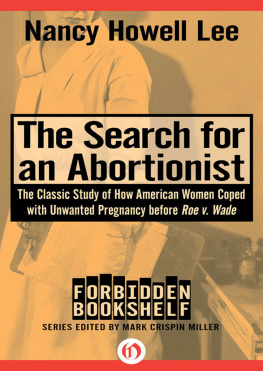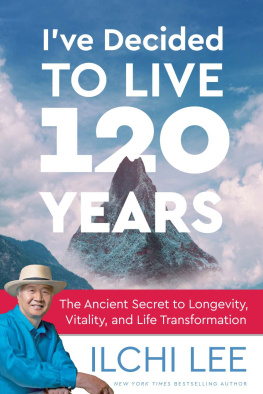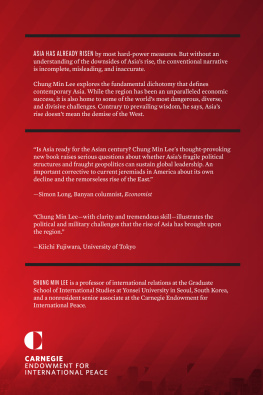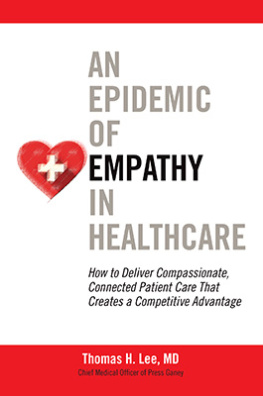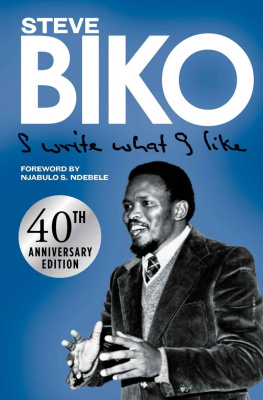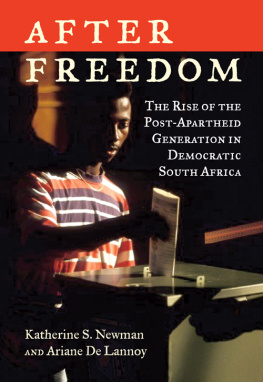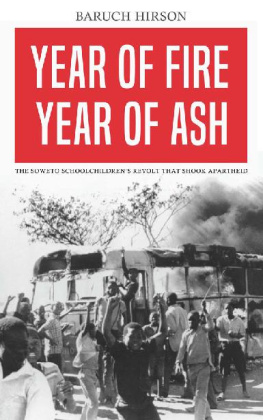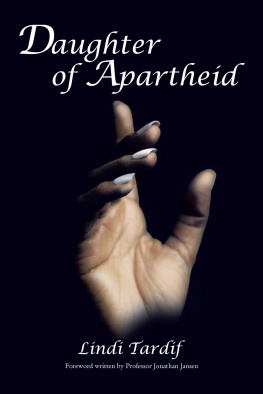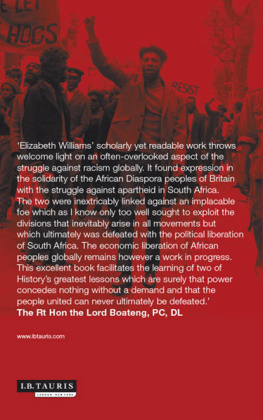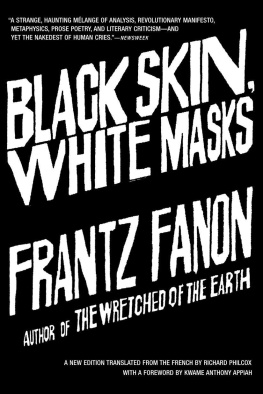Frantz Fanon
OHIO SHORT HISTORIES OF AFRICA
This series of Ohio Short Histories of Africa is meant for those who are looking for a brief but lively introduction to a wide range of topics in African history, politics, and biography, written by some of the leading experts in their fields.
Steve Biko
by Lindy Wilson
ISBN: 978-0-8214-2025-6
e-ISBN: 978-0-8214-4441-2
Spear of the Nation (Umkhonto weSizwe): South Africas Liberation Army, 1960s1990s
by Janet Cherry
ISBN: 978-0-8214-2026-3
e-ISBN: 978-0-8214-4443-6
Epidemics: The Story of South Africas Five Most Lethal Human Diseases
by Howard Phillips
ISBN: 978-0-8214-2028-7
e-ISBN: 978-0-8214-4442-9
South Africas Struggle for Human Rights
by Saul Dubow
ISBN: 978-0-8214-2027-0
e-ISBN: 978-0-8214-4440-5
San Rock Art
by J.D. Lewis-Williams
ISBN: 978-0-8214-2045-4
e-ISBN: 978-0-8214-4458-0
Ingrid Jonker: Poet under Apartheid
by Louise Viljoen
ISBN: 978-0-8214-2048-5
e-ISBN: 978-0-8214-4460-3
The ANC Youth League
by Clive Glaser
ISBN: 978-0-8214-2044-7
e-ISBN: 978-0-8214-4457-3
Govan Mbeki
by Colin Bundy
ISBN: 978-0-8214-2046-1
e-ISBN: 978-0-8214-4459-7
The Idea of the ANC
by Anthony Butler
ISBN: 978-0-8214-2053-9
e-ISBN: 978-0-8214-4463-4
Emperor Haile Selassie
by Bereket Habte Selassie
ISBN: 978-0-8214-2127-7
e-ISBN: 978-0-8214-4508-2
Thomas Sankara: An African Revolutionary
by Ernest Harsch
ISBN: 978-0-8214-2126-0
e-ISBN: 978-0-8214-4507-5
Patrice Lumumba
by Georges Nzongola-Ntalaja
ISBN: 978-0-8214-2125-3
e-ISBN: 978-0-8214-4506-8
Short-changed? South Africa since Apartheid
by Colin Bundy
ISBN: 978-0-8214-2155-0
e-ISBN: 978-0-8214-4525-9
The ANC Womens League: Sex, Gender and Politics
by Shireen Hassim
ISBN: 978-0-8214-2156-7
e-ISBN: 978-0-8214-4526-6
The Soweto Uprising
by Noor Nieftagodien
ISBN: 978-0-8214-2154-3
e-ISBN: 978-0-8214-4523-5
African Leaders of the Twentieth Century: Biko, Selassie, Lumumba, Sankara
ISBN: 978-0-8214-2161-1
Frantz Fanon: Toward a Revolutionary Humanism
by Christopher J. Lee
ISBN: 978-0-8214-2174-1
e-ISBN: 978-0-8214-4535-8
Frantz Fanon
Toward a Revolutionary Humanism
Christopher J. Lee
OHIO UNIVERSITY PRESS
ATHENS
Ohio University Press, Athens, Ohio 45701
ohioswallow.com
2015 by Ohio University Press
All rights reserved
To obtain permission to quote, reprint, or otherwise reproduce or distribute material from Ohio University Press publications, please contact our rights and permissions department at (740) 593-1154 or (740) 593-4536 (fax).
Printed in the United States of America
Ohio University Press books are printed on acid-free paper 
Cover design by Joey Hi-Fi
25 24 23 22 21 20 19 18 17 16 15 5 4 3 2 1
ISBN: 978-0-8214-2174-1
e-ISBN: 978-0-8214-4535-8
Library of Congress Cataloging-in-Publication Data available.
Names: Lee, Christopher J.
Title: Frantz Fanon : toward a revolutionary humanism / Christopher J. Lee.
Description: Athens, Ohio : Ohio University Press, [2015] | Series: Ohio short histories of Africa | Includes bibliographical references and index.
Identifiers: LCCN 2015030650| ISBN 9780821421741 (pb : alk. paper) | ISBN9780821445358 (pdf)
Subjects: LCSH: Fanon, Frantz, 19251961Political and social views. | Humanism. | AfricaColonial influence.
Classification: LCC JC273.F36 L44 2015 | DDC 320.01dc23
LC record available at http://lccn.loc.gov/2015030650
This book is for
Michael Brown Jr. (19962014)
Amadou Diallo (19761999)
Eric Garner (19702014)
Oscar Grant III (19862009)
Trayvon Martin (19952012)
Tamir Rice (20022014)
Contents
Illustrations
Figures
Maps
Preface
No pedagogy which is truly liberating can remain distinct from the oppressed by treating them as unfortunates and by presenting for their emulation models from among the oppressors. The oppressed must be their own example in the struggle for their redemption.
Paulo Freire, Pedagogy of the Oppressed (1970)
I first read Frantz Fanon in Gaborone, Botswana, when I was twenty-two. At the time my nascent professional ambitions had centered on ecology and environmental studies. Though I had heard Fanons name before, this period was the first occasion that I engaged his work seriously. I still have the used copy of The Wretched of the Earth I borrowed (and never returned), and, quite honestly, it gave the impression of being dated at the time. Reading it in southern, as opposed to north, Africa made its politics appear geographically distant. Its fervor for decolonization and Third World revolution seemed displaced after the end of the Cold War.
This initial impression soon transformed into a striking realization. A short distance away, South Africa was emerging from its remarkable democratic transition, only eighteen months into the postapartheid period. With Botswana a key frontline state during the antiapartheid struggle, Gaborone had been a base of operations for the Umkhonto we Sizwe (the MK, or Spear of the Nation)the military wing of the African National Congress and the South African Communist Partyin addition to providing a cross-border refuge for numerous activists fleeing the violent brutality of South Africas white minority regime during its final decades. In retrospect, I can imagine my beaten, secondhand edition of The Wretched of the Earth being in the possession of any number of people involved in the political struggle further south. Fanons work had been banned by the apartheid government, but, smuggled clandestinely into the country, it inspired a generation of activists, most significantly Steve Biko and the Black Consciousness Movement, which drew from Fanon to articulate and resist the psychological oppression of racism. The ideas embedded in Fanons writing retained an enduring vitality and mobility of influence beyond his own political circumstances during the mid-twentieth centurya recurrence of meaning that continues to the present. Indeed, since that distant time in Botswana, his work has powerfully informed two preceding book projects of my own, one portraying the rise of the Third World and the second deconstructing colonial legacies that still inhabit the present. A key incentive for pursuing this biography has been to revisit ideas that have proved so formative in my own life.
This book serves as an introduction to Fanon and, ideally, a preface for further engagement with his thought. Its primary aim is to encourage firsthand reading of his work for the uninitiated. Given the diverse breadth and sophistication of the existing secondary literature and the practical limitations of this book series, this intellectual biography does not claim comprehensiveness of factual detail or omniscience over how to interpret Fanons writingan impossible undertaking in this setting. Instead, it highlights key themes and, when appropriate, stresses underdeveloped ones. Inevitably, it bears the imprint of my own interpretations and thinking too. I encourage additional reading to do justice to his work and its meanings for a range of audiences.
Three features are worth mentioning at the outset. First, this book stresses a historical contextualization of Fanons work. Without question, Fanons reputation precedes him. Yet knowledge of his arguments is frequently based on assumption, rather than on careful reading. Indeed, Fanons thought is far more nuancedand pragmaticthan many of his admirers permit. Moreover, Fanon is often used as an entry point for understanding Martinique and Algeria, whereas I firmly believe the histories of Martinique and Algeria should be entry points for understanding Fanon. This empirical approach is not intended to diminish the life of his ideas. Instead, it is meant to emphasize Fanons acute sensibility toward the world around him and his unique ability to translate its broader repercussions.
Next page


